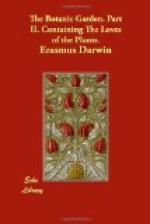Air separated from water by the attraction of points to water being less than that of the particles of water to each other
Minute division of sub-aquatic leaves
Water-cress and other aquatic plants inhabit all climates
Butomus esculent; Lotus of Egypt; Nymphaea
Ocymum covered with salt every night
Salt a remote cause of scrophula, and immediate cause of sea-scurvy
Coloured spatha of Arum, and blotched leaves, if they serve the purpose of a coloured petal
Tulip-roots with a red cuticle produce red flowers
Of vegetable mules the internal parts, at those of fructification, resemble the female parent; and the external parts, the male one
The same occurs in animal mules, as the common mule and the hinnus, and in sheep
The wind called Harmattan from volcanic eruptions; some epidemic coughs or influenza have the same origin
Fish killed in the sea by dry summers in Asia
Hedysarum gyrans perpetually moves its leaves like the respiration of animals
Plants possess a voluntary power of motion Loud cracks from ice-mountains explained
Muschus corallinus vegetates below the snow, where the heat is always about 40.
Quick growth of vegetables in northern latitudes after the solution of the snows explained
The Rail sleeps in the snow
Conserva aegagropila rolls about the bottom of lakes
Lycoperdon tuber, truffle, requires no light
Account of caprification
Figs wounded with a straw, and pears and plumbs wounded by insects ripen sooner, and become sweeter
Female figs closed on all sides, supposed to be monsters
Basaltic columns produced by volcanoes shewn by their form
Byssus floats on the sea in the day, and sinks in the night
Conserva polymorpha twice changes its colour and its form
Some seed-vessels and seeds resemble insects
Individuality of flowers not destroyed by the number of males or females which they contain
Trees are swarms of buds, which are individuals
INDEX OF THE NAMES OF THE PLANTS
Adonis
Aegragropila
Alcea
Amaryllis
Anemone
Anthoxanthum
Arum
Avena
Barometz
Bellis
Byssus
Cactus
Calendula
Callitriche
Canna
Cannabis
Capri-ficus
Carlina
Caryophyllus
Caffia
Cereus
Chondrilla
Chunda
Cinchona
Circaea
Cistus
Cocculus
Colchicum
Collinsonia
Conserva
Cupressus
Curcuma
Cuscuta
Cyclamen
Cyperus
Dianthus
Dictamnus
Digitalis
Dodecatheon
Draba
Drosera
Dypsacus
Ficus
Fucus
Fraxinella
Galanthus
Genista
Gloriosa
Gossypium
Hedysarum
Helianthus
Helleborus
Hippomane
Ilex
Impatiens
Iris




